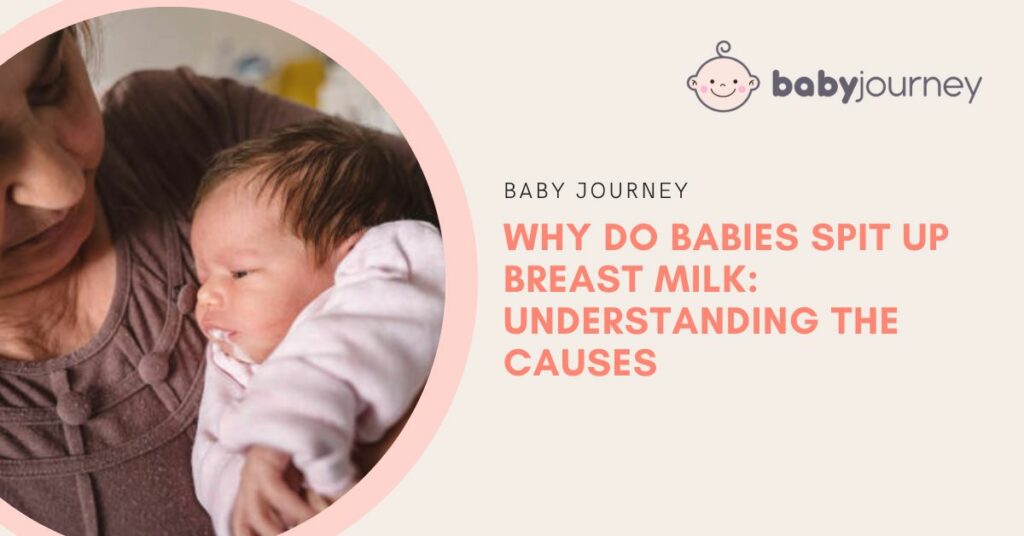Parents are wondering “Why does my baby keep sitting up breast milk?”, “Why does my baby spit up hours after eating?” and “Why do babies spit up breast milk?” Babies spitting up breast milk is a common concern for many new parents. It can be alarming to see your little one regurgitating milk after a feeding, but it’s important to know that it’s usually not a cause for concern. In fact, spitting up is a normal part of a baby’s digestive process.
Spitting up occurs when a baby’s stomach contents are brought back up into their mouth. This can happen for a variety of reasons, such as overfeeding, swallowing air while feeding, or an immature digestive system. Breastfed babies may also spit up due to an imbalance of foremilk and hindmilk, which can cause them to take in too much lactose at once. While spitting up can be messy and inconvenient, it’s generally not a sign of a more serious problem.
Also read: Soothers for Breastfed Baby
What is Spit Up?
Spitting up is a common occurrence in babies, and it is not usually a cause for concern. Spit up, also known as posseting, is when a baby brings up small amounts of milk or food from their stomach. It is different from vomiting, which is more forceful and can be a sign of illness.
Breastfed Babies
So why do babies spit up breast milk? These babies are more likely to spit up than formula-fed babies. This is because breast milk is easier to digest, and babies can take in more milk at once. When baby is spitting up breast milk, it is usually a small amount and does not cause any discomfort.
Also read: How to Produce More Breastmilk
Formula-fed Babies
Formula-fed babies can also spit up, but it is less common than in breastfed babies. Formula is thicker and takes longer to digest, so babies may not take in as much at once. When a baby spits up formula, it can be a larger amount and may cause discomfort.
In summary, spitting up is a common occurrence in babies, and it is not usually a cause for concern. Breastfed babies are more likely to spit up than formula-fed babies, but both can experience it. Parents can try to prevent spitting up by burping their baby and feeding them in an upright position.
Causes of Spit Up
Parents may be questioned:
“Why is my baby suddenly spitting up?” “Why does my baby spit up a lot?” “Why does my baby keep spitting up?”
Babies spitting up breast milk is a common occurrence that many parents experience. There are several reasons why babies spit up, and some of the most common causes are discussed below.
Gastroesophageal Reflux
Gastroesophageal reflux (GER) is a condition where the contents of the stomach flow back up into the esophagus. This is a normal process that occurs in most infants, and it usually resolves on its own by the time the baby is one year old. GER can cause baby spitting, and it is more common in babies who are born prematurely.
Overfeeding
Overfeeding is another common cause of baby spitting. When a baby is fed too much, the stomach can become too full, and this can cause the milk to come back up. It is important to feed babies in smaller, more frequent feedings to avoid overfeeding.
Also read: How to Make Breast Milk Soap
Food Sensitivities
Food sensitivities can also cause babies to spit up breast milk. Some babies may be sensitive to certain foods in their mother’s diet, such as dairy products, which can cause baby spitting more frequently. If a baby has a food sensitivity, it is important to identify the culprit and eliminate it from the mother’s diet.
It is important to note that while spit up is a common occurrence, there are some signs that may indicate a more serious condition. If a baby is not gaining weight, is consistently uncomfortable, or is projectile vomiting, it may be a sign of gastroesophageal reflux disease (GERD) or other digestive system issues. In these cases, it is important to consult a doctor for proper diagnosis and treatment.
Overall, understanding the causes of spit up in babies can help parents take steps to reduce it and keep their babies comfortable during feedings.
Also read: Why Is My Baby Spitting Up Clear Liquid?
How to Reduce Spit Up
Babies often spit up after feedings, and while it is normal, it can be concerning for parents. Fortunately, there are ways to reduce the frequency and amount of spit-up.
Burping
Burping your baby after each feeding can help reduce spit-up. This allows them to release any air bubbles that were created during a feeding. It is recommended to burp your baby every 2-3 ounces if bottle-feeding or after each breast when nursing.
Feeding Techniques
Feeding techniques can also play a role in reducing spit-up. It is important to keep feedings calm and quiet to avoid distressing the baby. Additionally, feeding smaller amounts more frequently can help reduce the amount of milk in the baby’s tummy, which can lead to less spit-up.
Upright Position
Keeping your baby in an upright position after feedings can also help reduce spit-up. This can be achieved by holding them upright for 20-30 minutes after feeding or by using an infant swing. Avoiding distractions and noise during this time can help keep the baby calm and relaxed.
It’s important to note that certain foods, such as dairy products, can increase the likelihood of spit-up in breastfed babies. If the baby seems to be in pain or is experiencing projectile vomiting, it’s recommended to consult a healthcare provider to rule out conditions such as gastroesophageal reflux disease (GERD) or pyloric stenosis. Additionally, if the baby is showing signs of dehydration or difficulty breathing, seek medical attention immediately.
Overall, reducing spit-up can be achieved through simple techniques such as burping, feeding techniques, and keeping the baby in an upright position. While spit-up is normal, it’s important to monitor the frequency and amount to ensure the baby is gaining weight and not experiencing any discomfort.
When to See a Doctor
Babies spitting up breast milk is a common occurrence and usually not a cause for concern. However, there are times when it may be necessary to consult a doctor.
Signs of a Health Concern
If a baby is spitting up excessively or forcefully, it may be a sign of a health concern. Other signs to look out for include:
- Refusal to feed
- Irritability or fussiness during or after feeding
- Arching of the back during or after feeding
- Coughing or choking during or after feeding
- Blood in the spit-up
- Green bile in the spit-up
- Consistently spitting up more than an ounce of milk at a time
- Not gaining weight or losing weight
These signs that cause babies spit up may indicate a more serious issue, such as gastroesophageal reflux disease (GERD) or an allergy or sensitivity to something in the mother’s breast milk. In rare cases, excessive spitting up can lead to complications such as dehydration or electrolyte imbalances.
Also read: Why Does My Baby Spit Up Curdled Milk?
If any of these signs are present, it is important to consult a doctor. The doctor may recommend changes to the baby’s feeding routine or refer the baby to a lactation consultant. In some cases, medication may be necessary to treat GERD or other underlying conditions.
It is also important to note that sudden changes in a baby’s spitting up behavior could be a sign of a more serious issue, such as teething or a digestive problem. If a baby who previously spit up infrequently suddenly begins to spit up more often, it may be worth consulting a doctor to rule out any potential health concerns.
Overall, while spitting up breast milk is a normal part of a baby’s digestion process, it is important to be aware of any signs of a health concern and seek medical attention if necessary.
Conclusion
Spitting up breast milk is a common occurrence in infants that can be caused by a variety of factors. While it can be concerning for new parents, it is important to remember that it is usually not a cause for alarm. Most babies outgrow spitting up by the time they are one year old.
Parents can take steps to reduce the amount of spitting up by burping their baby frequently during feedings and keeping them upright for at least 30 minutes after feeding. It is also important to ensure a proper latch during breastfeeding to prevent the baby from swallowing excess air.
In some cases, spitting up can be a sign of an underlying issue such as gastroesophageal reflux disease (GERD) or food allergies. If a baby is showing signs of discomfort, such as arching their back or crying during feedings, or if there is excessive spitting up, it is important to consult with a pediatrician.
Overall, spitting up breast milk is a normal part of infant development and is usually not a cause for concern. By taking simple steps to reduce spitting up and monitoring for any signs of discomfort, parents can help ensure their baby is healthy and happy.
Frequently Asked Questions (FAQ)
How much spit up is normal for a newborn?
It is normal for a newborn to spit up after feeding. According to Mayo Clinic, a baby may spit up as much as 1 to 2 tablespoons after feeding. However, if your baby is spitting up more than this amount or seems to be in pain, consult your pediatrician.
Should I feed my baby again after spitting up?
If your baby seems hungry after spitting up, it is generally safe to feed them again. However, suggests waiting at least 30 minutes to allow your baby’s stomach to settle. If your baby continues to spit up after every feeding, consult your pediatrician.
Does spit up mean overfeeding?
Not necessarily. Babies may spit up for various reasons, including swallowing air while feeding, having a weak muscle that separates the stomach and esophagus, or having an immature digestive system. However, overfeeding can also cause spitting up. If you suspect that your baby is spitting up due to overfeeding, try feeding them smaller amounts more frequently.
How do I stop my breastfed baby from spitting up?
While there is no guaranteed way to prevent spitting up, there are a few things you can try. Medela suggests feeding your baby in an upright position, burping them frequently during feeding, and avoiding overfeeding. Additionally, make sure that your baby is latching properly to prevent them from swallowing air while feeding.
What to do if baby spits up while sleeping?
If your baby spits up while sleeping, you are recommend gently turning their head to the side to prevent choking. You may also want to elevate the head of their crib slightly to help prevent spitting up.
How often should a breastfed baby spit up?
The frequency of spitting up varies from baby to baby. Some babies may spit up after every feeding, while others may only spit up occasionally. As long as your baby is gaining weight and seems otherwise healthy, there is generally no need for concern. However, if you are concerned about the frequency or amount of your baby’s spitting up, consult your pediatrician.



